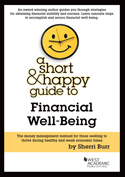by Sherri Burr
What happens to you when you realize you aren’t good at something that would be helpful to you in your career? This question was recently posed by the website TransitioningYourLife.com in the article “How to Stop Your Weaknesses from Bringing You Down.”
“Most people,” the article said, “try to improve our weak areas” because “[w]e believe that our weaknesses matter more in holding us back than our strengths matter in advancing us.”
Wrong answer, according to authors Marcus Buckingham and Donald Clifton in their book Now, Discover Your Strengths. They suggest, “The better strategy is to play to your strengths, building upon your core talents and work around your weaknesses. You can add skills and knowledge to increase your performance in your area, but unless you are building on one of your innate talents (aka strengths), your efforts won’t produce exceptional results—some results, yes, but not dramatic improvement.”
As I read these words, I thought of how this advice might apply to the writing life. I remembered my friend Carolyn Wheelock once pitched and received an assignment to write an article about hats for a women’s magazine, but encountered a problem when the magazine wanted accompanying photos. Since Carolyn felt she was not good at photography, she called and asked me to photograph the hats for her. Outsourcing her weakness to yours truly worked well for both of us. She kept her commitment to the magazine, and I received a photography credit.
While this was a win-win, there might be weaknesses a writer could not delegate. What if a writer struggled with grammar or spelling? While software can correct some issues, auto correct may create even more problems. If you do not know the rules, you may not recognize that a word is used in the wrong context even though it’s spelled correctly. Without knowledge of grammar, you may miss the issue.
Dealing with your weaknesses may be fundamental to success in your chosen profession, and you may have no choice but to put in the time to improve them. While watching tennis matches during the Wimbledon fortnight, for example, it occurred to me that a player with a weak serve is in deep trouble. Not only does the player fail to obtain easy points by hitting aces, he or she increases the chances that other players will break their serve and win the match. A serve cannot be outsourced.
For writers, the serve is the equivalent of mastering the tools of grammar and spelling. They are the building blocks for the stories we tell. Hiring an editor could correct some problems, but beware. Since word choices are critical to story meaning, an editor could accidentally change the message just by replacing a word or two. Grammar and spelling are key ingredients for our written creations. They must be mastered to build strength in either fiction or nonfiction.
But what constitutes innate strength? In their book, authors Buckingham and Clifton define a strength as “consistent near perfect performance in an activity.” Some writers achieve “consistent near perfection” when producing fiction, others nonfiction. The excellence is evidenced by strong sales and important awards.
Once writers reach the stratosphere of their profession, expansion to other creative outlets is possible. For example, Janet Evanovich who created the highly successful fictional Stephanie Plum series also penned the book How I Write. She mentioned accumulating approximately ten years of rejection slips before she was first published. During that decade she perfected her craft.
Similarly, mystery writer Tony Hillerman mastered writing as a journalist before authoring mysteries. It was only after he became a New York Times best-selling author of dozens of books set on the Navajo reservation that he penned his memoir Seldom Disappointed. Hillerman’s memoir extended his “near perfect performance” as a mystery writer into another writing realm.
Evanovich and Hillerman prove that playing to writing strengths after mastering the core elements can lead to exceptional results, such as landing at the top of best-sellers’ lists. When they expanded into nonfiction, they did not stray too far from their innate talent of writing fiction.
For writers, our challenge is to master our core and play to our strengths. We can stop our weaknesses from bringing us down by delegating what we do not do well and what is not critical to learn. Go forth and let your strengths advance you up the writing ladder of success.
 Sherri Burr is the Regents’ Professor of Law at the University of New Mexico School of Law where she teaches Entertainment Law, Intellectual Property Law, and Art Law. A graduate of Mount Holyoke College, Princeton University, and the Yale Law School, she has authored or co-authored 20 books, including A Short and Happy Guide to Financial Well-Being (West Academic, 2014). Sherri is also a long-time member of SouthWest Writers and a regular contributor to the organization’s newsletter SouthWest Sage.
Sherri Burr is the Regents’ Professor of Law at the University of New Mexico School of Law where she teaches Entertainment Law, Intellectual Property Law, and Art Law. A graduate of Mount Holyoke College, Princeton University, and the Yale Law School, she has authored or co-authored 20 books, including A Short and Happy Guide to Financial Well-Being (West Academic, 2014). Sherri is also a long-time member of SouthWest Writers and a regular contributor to the organization’s newsletter SouthWest Sage.
This article was originally published in the September 2013 issue of SouthWest Sage and is reprinted here by permission of the author.



Leave a Reply